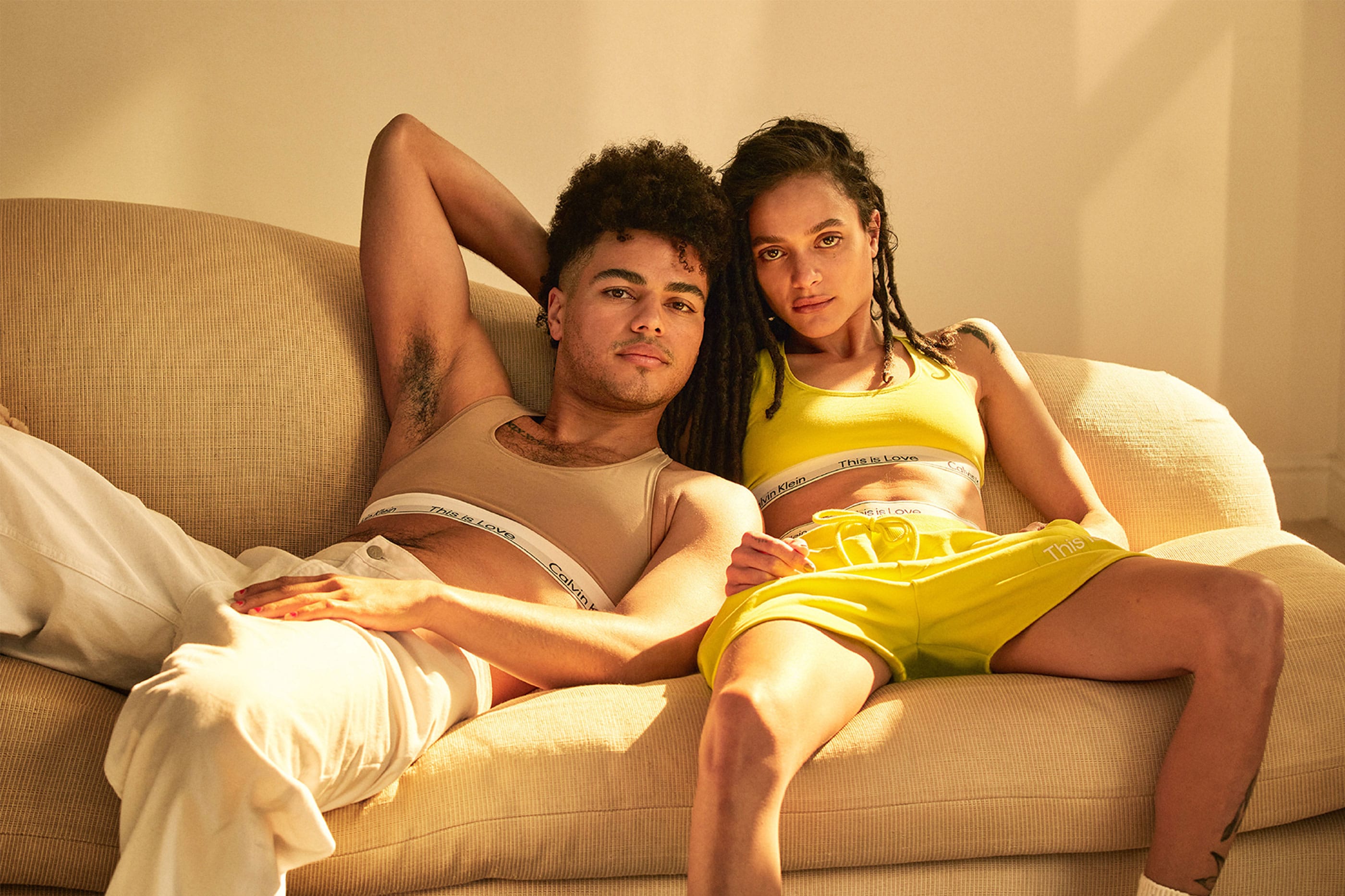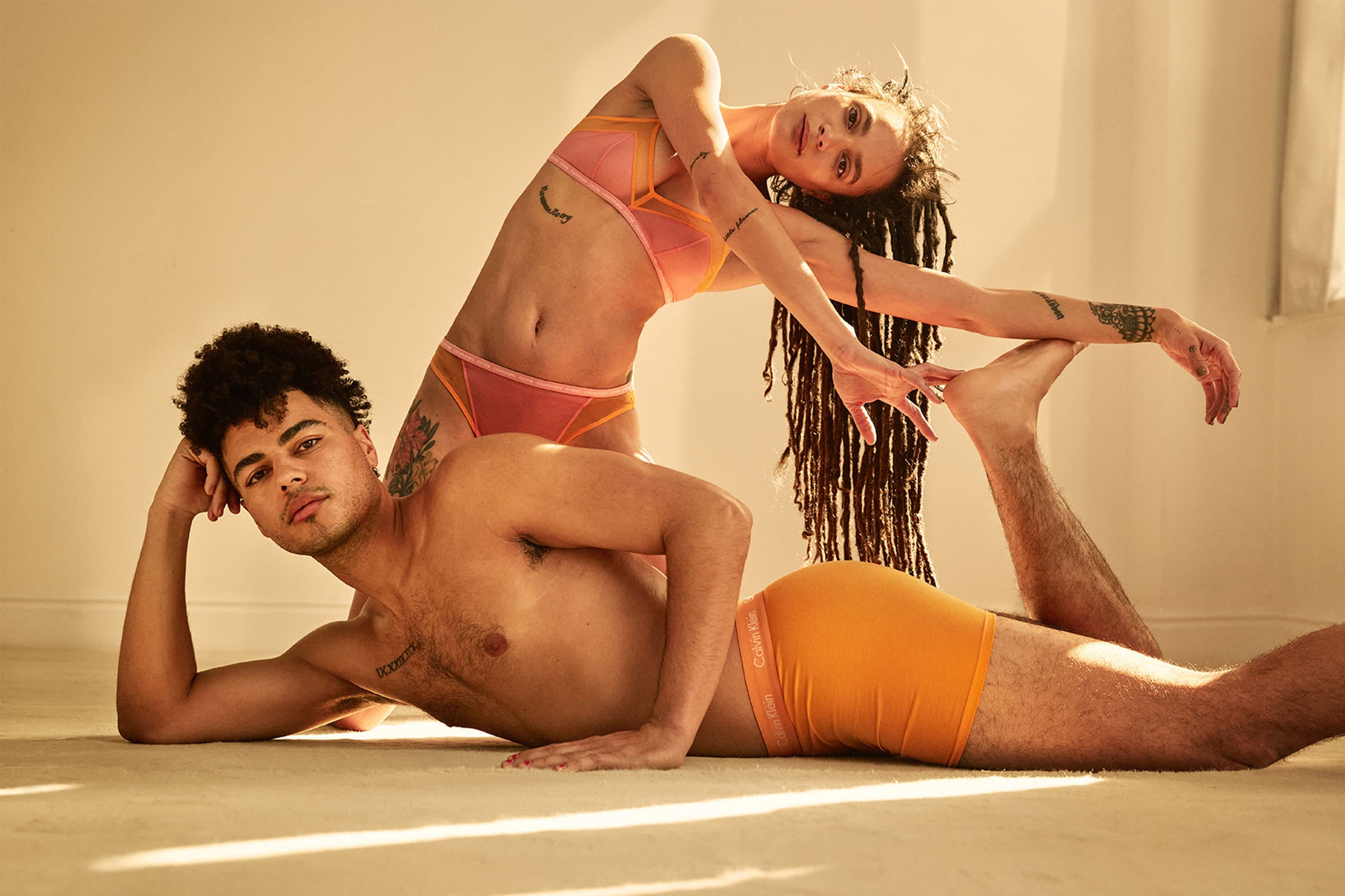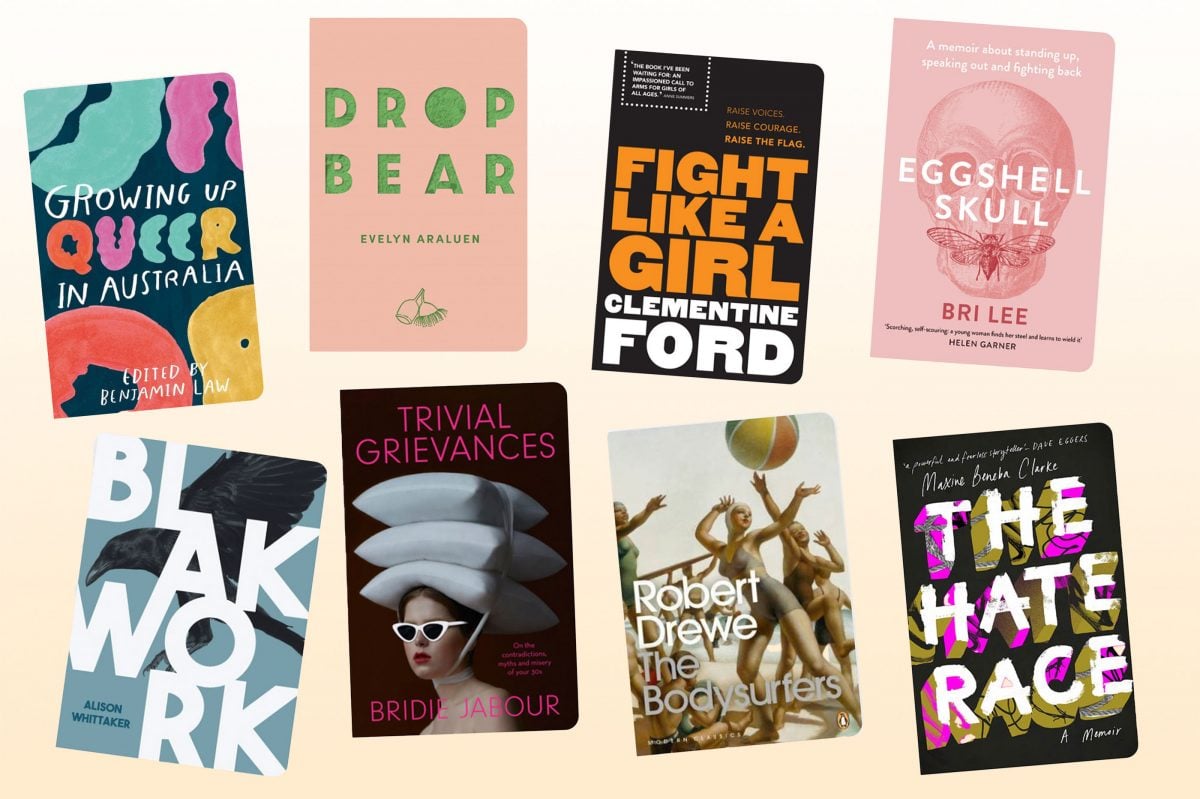
"To have a chosen family is the biggest thing, because it has nothing to do with conditions. You have chosen them and they have chosen you, and there is a path that you guys are going to be there for each other." For Sasha Lane, this is what makes her feel most safe. It is also the theme for Calvin Klein's Pride campaign this year, which Lane stars in with her brother, Sergio D'arcy Lane.
When we speak, Lane is back home in Georgia with her daughter, noting that, off the back of her most recent, highly successful role as Bobbi in the new Conversations With Friends adaptation, things have been "a whirlwind" lately and that she is thankful to be busy, "but also busy with a kid. It's a different story." she laughs.
If you watched the show, you'll understand why Lane, and her interpretation of her complicated character, Bobbi, has many of us so fascinated by her. She is both warm and direct with a sense of vulnerability about her that feels refreshingly at ease. Most of all, she is honest – in her intention, in her work, in our interview. It is perhaps one of the reasons so many people could connect to her portrayal of Bobbi almost better than author Sally Rooney's original depiction, because she lends some of the most human qualities – the ones that live deep inside us like vulnerability, insecurity, desire, and love – to a character that so many people dismissed as one note. Through this, Lane's Bobbi reminds us of someone: our best friend, our sister, our ex, our parents, ourselves, even. For Lane, the latter is the case for her relationship with the character on everyone's mind right now.
Below, Lane tells us what these parallels between her and Bobbi are, what makes her feel most vulnerable, and the importance of the chosen family.

Tell us what it was like to be part of CK’s Pride campaign this year…
My brother has always been a huge fan of Calvin Klein. And I remember being in Chicago and taking photos of him for the campaign or something…I think for social media. But my brother is obviously my best friend, he means the world to me, and I feel like we've had such a journey in life together, so to be able to do anything together is already a big deal. But then to do something that I know he respects a lot – I respect a lot. I think that Calvin Klein did an incredible job with this campaign this year. I think it really spoke to a lot of people, so I take a lot of my own pride in that as well. Because it wasn't just putting some colours on something and saying “this is Pride”, they really told the story. So to be able to do that with someone, it just felt like family captured moments for us. I think we're both just really honoured and really appreciate it.
Have you and your brother worked a lot together before?
We've done a few magazines together, and I think one other campaign together. And I always tell people, I'm a much happier person, especially with photos and all that when my brother's involved, so I think that's always a plus for everyone. I don't think I’ve laughed and danced around as much as when Sergio has been there. But I think this is one of the biggest ones for us. So this is a huge deal.
On Conversations With Friends, what was it like to play a character so many people had their own expectations of?
I think for me personally, because I've done a few things that have been adaptations, I knew that for the writers of the show, and the director, and all of the people involved, we knew that, yes, we were taking a body of work, but when you adapt something, you are involving an actual human. So it's always going to be a bit different. You're going to get to get a bit more of a fulfilment out of the story. But also you'll make a few things different because you can't hit every mark. But I think for me, I personally took it as less of a pressure thing and more of a challenge. I think, specifically with Bobbi, because she's not as heavily mentioned as Francis – because it's through Francis’ perspective. So for me, it was more of an excitement and a bit of a drive to say, “Okay, I'm going to take this character that I know is easily portrayed as one thing, and I'm going to completely flip it, while keeping true to what Sally has written. But also, I'm going to give you the complete 360 of her, because now she actually is there and she's visible,” and you get to see the full conversation and everything that happens that's not just from one side.
What was that one thing you felt Bobbi was portrayed as?
I think people view Bobbi as the extroverted one, which I think a lot of people take an extrovert and someone who's very opinionated as someone who can be rude, and bold, and they just want all the attention. And it's just so easy to put them in this stereotype. For me, that was a really big deal, because I feel like with my life and my career, that's kind of happened to me a lot, so I wanted to show the other side of Bobbi, the more vulnerable side and the more sensitive side and also show the fact that just because you speak your opinion doesn't mean that there's anything wrong with that, especially as a woman, it just means that you happen to be vocal, which I think is a good thing. There's so much that's unsaid when it could just be spoken and doesn't have to even be in a bad way or a mean way, just spoken. I think a lot of people are intimidated by that. They just assume that it means you're just rude.
Do you connect with Bobbi in this sense?
I think it is the fact of being kind of misunderstood in different ways. Not necessarily in the same way that Bobbi was, but I think a lot of people will watch my films or maybe even see me with my brother or something and just think she's full of energy and she's the life of the party and she's all these things. She’s wild, she's down for the experience, and all of that. It’s just not who I am necessarily, and especially when people meet me in person, they're always kind of like, “Oh”, it's just a big “Oh”, and I'm like, well that was a film, or a photo. I think that's what I love most about Bobbi is like, here's what you think she is, but there is another half and it's not until you actually get to know her that you'll see that she's not just how one person has portrayed her.
How do you feel your experiences with your identity lent themselves to Bobbi's experiences, and helped you triumph them?
I think for me, from a very early age I've always kind of known my capability, and also the possibility to love people that oneself might not necessarily think they could love or care for, even if people don’t think it makes sense. Like, I have a child, but I've always spoken about being queer and just not wanting to be labelled. I've never identified as a lesbian like Bobbi does, but it doesn't mean that I don't identify with the queer world, and that I'm not going to speak on the openness of love and openness to not knowing who you are necessarily, unless you've experienced it, or have allowed that experience to come into your life. You know, I think it's one thing to say, “oh, I won't ever go for this person,” or, “I won't ever go for a relationship with more than one person". But it's like, unless you met that experience, or met that person, then how are you to really know?
I think that's kind of how Bobbi is, even though she identifies as a lesbian, and she makes a few jokes to Francis, but she's the one telling her to just go for it, and just allow life and love to really orientate yourself and see where it takes you without judgement. Even if you have an opinion, you can still eliminate pure judgement from that, and I think for me, that was really nice to be able to play and portray. We evolve as people and I've always been a big believer of love kind of overtaking any boundary or any kind of stereotype.
I think for queer people, being able to see that kind of that uncertainty on screen was quite comforting in a sense. Showing a different perspective of people not necessarily having their identities figured out was quite refreshing…
Yeah. And there's no shame in not knowing and there's no shame in knowing.
It often felt like Bobbi and Francis were on the precipice of shifting the dynamic before kind of falling back into old patterns. How did you and Alison manage this dynamic in such a tender way?
Me and Alison very much are Francis and Bobbi in our real lives, but we're the opposite. I think that's kind of what you see in that. Ali is a lot more extroverted than I am, and she's a lot bolder sometimes with her emotions. It's just this funny thing as Ali was usually the one checking on me when Bobbi's usually the one checking on Francis, so when you kind of have, like I said, real people playing roles, your own personal feelings, thoughts, and the way you interact, start to seep through a little bit.
Even in friendships and relationships, in general, you kind of take turns. One person cannot be the strong one the entire time, they cannot be the emotional one the entire time, or the logical one, you kind of have to find balance to breathe, I think. And I think for us, the way the relationship has lasted so long, there has to be a bit of a give and take here and a bit of a shift and dynamic.
You gave Bobbi’s character such vulnerability. What makes you feel vulnerable in real life?
I've always been a people pleaser, but not necessarily just people in general. I aim to work hard and aim to please, but I am such a huge empath, because I'm constantly worried, and wondering about the people around me and how they're feeling. I think because I've always been kind of self-critical of the power of my own emotions and my moods and my own mental health, so to be in this space with me, means that you have to have complete understanding, and I understand the weight of that. The thing that makes me the most vulnerable is to overcrowd people with my own thoughts and my own emotion and putting that space out there. I don't know if that makes sense, but I'm constantly just wondering how the person that I care about is feeling and what they're thinking, and if I'm doing enough to help them. Especially now having a child, there are so many things that I want to teach her and there's so many things I want to do, so I have to make sure that I am doing them for myself first. And I think that's kind of what strips me back into a place of no hiding because you really can't hide from a child, they'll see everything, feel everything, so if it's already like that, with my family and my friends that I care about, imagine that small human that relies on everything about you for their survival, and you're just like, “oh my god, I have to be vulnerable and self-reflect and also love myself during the self-reflection and the changing of who I am in those moments so that this person and the people around me never feel like they have to take care of it all the time.”
And what makes you feel most safe?
I think, and honestly, this is why I love the Pride campaign so much, is because the chosen family that I have, the people that I specifically have kept in my life and I'm surrounded by right now, are the people that I know, no matter how much I spiral or react in a moment, or do the weird things that I do, they have stayed here. And I have also chosen them. It's not like they're forced to be here and forced to be surrounded by me, or to call me or anything, these are the people that I have worked really, really hard at keeping and have chosen specifically, and remind me that I am actually a solid person, and then I'm okay. I think that it's so refreshing to know that I have someone to call and to vent to. I cut my own hair, and my daughter came and she just said, “you're so beautiful Mom, I love your hair.” I was like, “oh my god, give me a break". Come on, that's amazing. I think my little family really, really makes me feel seen in that. And then then I'm doing okay.
For so many queer people the chosen family is really integral to our survival. Does this resonate?
Definitely. I think for people who grew up in damaged families, or with damaged minds, and then also especially people who are queer, it is. I've been to so many different hospitals and places that a lot of people were placed, not because they had problems necessarily, but because they were neglected, and they had anger and sadness, and people did not know what to do with it. So to have a chosen family is the biggest thing because it has nothing to do with conditions. You have chosen them and they have chosen you, and there is a path that you guys are going to be there for each other. And if someone breaks off, they break off but that's okay, because then they’re no longer choosing you, or you're no longer choosing them, and that's the beauty of it. I think that’s why I love Calvin Klein for that. It's so big. It's so big.
I feel like it’s great to see more discourse around the idea of chosen families as well to break away from the conditioning of what a family should look like…
I always say, “your parents are going to go do what they want to do,” right? And then eventually they leave, unfortunately, and same with your children, same with your friends, they're all doing it for themselves as well. So if you're only aiming to please this person, and not making yourself happy, it's not doing anything for you. We've seen what that's done for a lot of people, is wishing that their mothers and their fathers and their grandparents could be what they have chosen out of the family around them. But more often than not, it's not the case. Which is why we rely even more on the people that we do choose and that choose us back. And that's okay. If that's your family, then that's your family.



